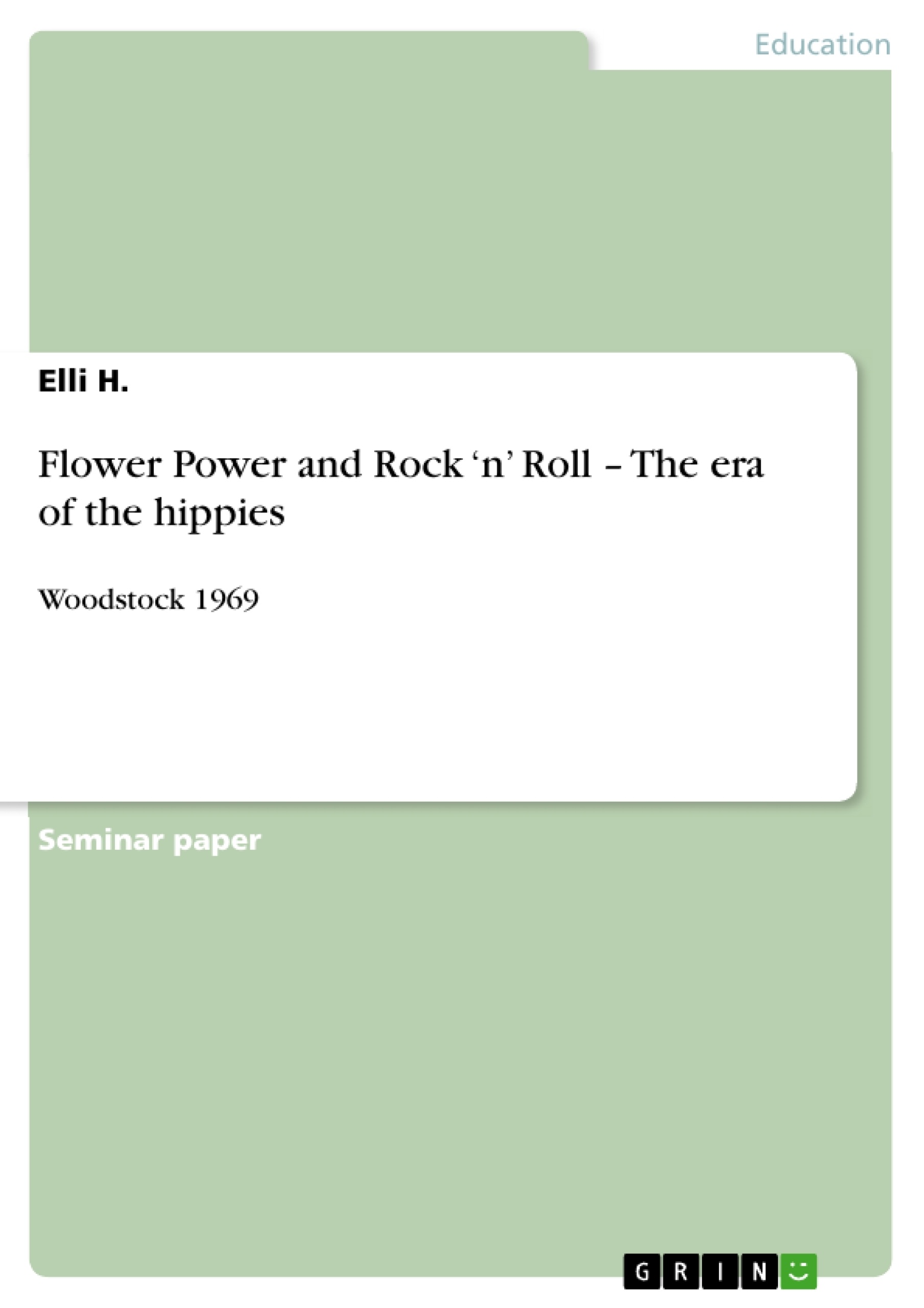1. Introduction
The following term paper is dealing with the era of the hippies, their ideals, their music and the question what makes a person a hippie. Therefore, the social and political background is described to show how the movement could develop. Moreover, the highlight of the era – the Woodstock Festival – is illustrated as a representative for all the other festival during these years. Furthermore, I am trying to find access to the subject if the hippies were just another kind of youth culture that died with their icons or if it was more. Is it possible that the core of the hippie philosophy, based on its social background and peculiarities, is still alive somehow?
Table of Contents
- Introduction
- The 1960's in America
- The Vietnam War
- The Anti-Racism movements
- What does it mean to be a hippie?
- Lifestyle and ideals
- Hippies and their music
- Woodstock 1969 - The festival
- Performing artists and events
- At the height of music and the end of an era
Objectives and Key Themes
This paper explores the hippie movement of the 1960s, examining its ideals, music, and the social and political context that fueled its rise. It aims to understand what defined a hippie, and whether the core philosophy of the movement persists today. The paper uses the Woodstock festival as a case study to represent the broader cultural phenomena of the era.
- The socio-political climate of 1960s America, including the Vietnam War and the Civil Rights Movement.
- The defining characteristics and beliefs of the hippie movement.
- The role of music in shaping and expressing the hippie counterculture.
- The Woodstock festival as a pivotal event representing the hippie era.
- The lasting impact and legacy of the hippie movement's core philosophy.
Chapter Summaries
Introduction: This introductory chapter sets the stage for the paper, outlining its focus on the hippie movement, its ideals, music, and the broader societal context of 1960s America. It poses the central question of what constituted a hippie and explores the possibility of the movement's enduring influence. The chapter establishes the scope of the research and previews the key areas of investigation, including the Vietnam War, the Civil Rights Movement, and the Woodstock festival.
The 1960's in America: This chapter provides historical context by examining significant events of the 1960s in America. It highlights the Vietnam War as a defining conflict, discussing its impact on American society and the emergence of anti-war sentiments. It connects the war to the broader socio-political climate, emphasizing its role in shaping the hippie counterculture. The chapter further explores the Civil Rights movement, illustrating its parallel development with the anti-war movement and its contribution to the social upheaval of the era. The chapter also examines the confluence of these events, leading to a generational shift in values and beliefs.
What does it mean to be a hippie?: This chapter delves into the core tenets of the hippie philosophy. It investigates the various aspects of hippie identity, moving beyond superficial markers like clothing and music to explore the deeper values of peace, love, and tolerance. It traces the movement's origins in the Beat Generation, highlighting the rejection of mainstream societal norms and the embrace of alternative spiritualities, environmentalism, and political activism. The chapter emphasizes the hippies' rejection of materialism and their focus on community and self-expression.
Keywords
Hippie movement, 1960s counterculture, Vietnam War, Civil Rights Movement, Woodstock, peace, love, tolerance, anti-materialism, social activism, environmentalism, music, Beat Generation.
Frequently Asked Questions: A Comprehensive Language Preview
What is the overall topic of this document?
This document provides a comprehensive preview of a paper exploring the hippie movement of the 1960s. It covers the historical context, key themes, chapter summaries, and keywords related to the subject.
What historical events are discussed in relation to the hippie movement?
The document highlights the Vietnam War and the Civil Rights Movement as significant events of the 1960s that shaped the socio-political climate and influenced the rise of the hippie counterculture.
What are the key themes explored in the paper?
Key themes include the socio-political climate of 1960s America, the defining characteristics and beliefs of the hippie movement, the role of music in shaping the counterculture, the Woodstock festival as a pivotal event, and the lasting impact of the hippie movement's philosophy.
What are the main chapters covered in the paper, and what do they focus on?
The paper includes an introduction setting the stage and outlining the research scope. A chapter on the 1960s in America provides historical context focusing on the Vietnam War and the Civil Rights Movement. A chapter explores the core tenets of hippie philosophy, examining their values and lifestyle. The paper also uses Woodstock 1969 as a case study.
What is the significance of Woodstock in this context?
The Woodstock festival of 1969 serves as a case study to represent the broader cultural phenomena of the hippie era, highlighting its importance as a pivotal event in the movement.
What are some of the key defining characteristics of the hippie movement, according to the document?
The document mentions peace, love, tolerance, anti-materialism, social activism, environmentalism, and a rejection of mainstream societal norms as core values and characteristics of the hippie movement.
What is the central question the paper aims to answer?
The paper seeks to understand what defined a hippie and whether the core philosophy of the movement persists today.
What keywords are associated with this topic?
Keywords include: Hippie movement, 1960s counterculture, Vietnam War, Civil Rights Movement, Woodstock, peace, love, tolerance, anti-materialism, social activism, environmentalism, music, and Beat Generation.
What is the intended audience for this preview?
This preview is intended for academic use, aiming to provide a structured and professional analysis of the themes within the paper.
- Quote paper
- Elli H. (Author), 2007, Flower Power and Rock ‘n’ Roll – The era of the hippies, Munich, GRIN Verlag, https://www.grin.com/document/175344




